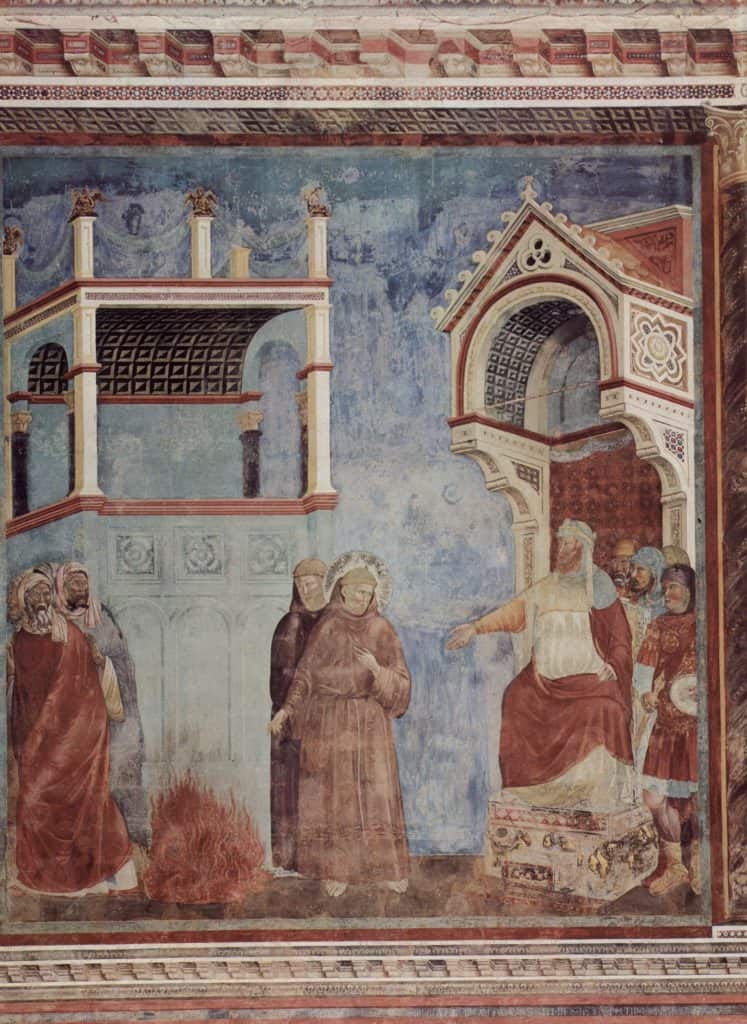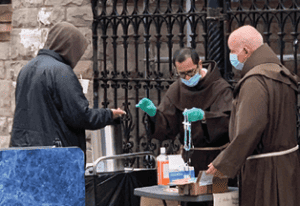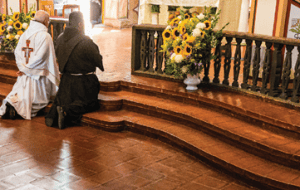Franciscan Thoughts
Through the Lens of “Fratelli Tutti”
BY MICHAEL BLASTIC, OFM

In his encyclical “Fratelli Tutti,” Pope Francis presents a compelling blueprint for social engagement, a way of actively participating in society, that can lead
to a better world for all. Pope Francis explains that his inspiration was St. Francis of Assisi as a model of “fraternal love…that transcends the barriers of geography and distance.” He points to the encounter of Francis of Assisi with Sultan al-Malik al-Kamil as a model of social engagement because St. Francis “approaches others, not to draw them into his own life, but to help them become even more themselves.” The Poverello’s lifestyle of brotherly and sisterly encounter, care, and solidarity are qualities for social friendship that Pope Francis develops.
Franciscans live the Gospel by following in the footsteps of Jesus. They understand that Franciscan mission includes social engagement, which is modeled on the life of the disciples. In the 13th century “Earlier Rule” Francis- cans describe their mission as a “going about the world,” taking nothing for the journey, sent by Jesus to be peace- bearers to the people and communities they encounter, where they accept hospitality as pilgrims and guests (see Luke 10:1–11).
The brothers and sisters met people where they were actually living, in the ordinary, everyday conditions of life. They sat down at table with them and shared the food and drink offered. In response to the hospitality of their hosts, they shared the good news of healing, forgiveness, and the peace of God’s reign. In a real sense then, Franciscan mission, then and today, is accomplished through participating in social life inspired by the example and words of Jesus Christ.
Francis of Assisi learned this through his encounters with lepers. “The Lord led me among [lepers] and I did mercy with them,” he wrote. Francis was clear about what God did and wanted from him—God didn’t ask Francis to do something to or for the lepers; God ledFrancis to share mercy with the lepers as his brothers and sisters through encounter, care, and solidarity. In “Fratelli Tutti,” the pope comments on the parable of the Good Samaritan
(Luke 10:25–37), stating that the par- able, “Speaks to us of an essential and often forgotten aspect of our common humanity: we were created for a fulfillment that can only be found in love. We cannot be indifferent to suffering; we cannot allow anyone to go through life as an outcast. Instead, we should feel in- dignant, challenged to emerge from our comfortable isolation and to be changed by our contact with human suffering.”
The pope echoes St. Francis’ experience of the suffering and pain of those who were forgotten and excluded— Francis encountered lepers as brother and sister, he cared for them, and he stayed with them in solidarity. This is the way of social engagement necessary to build a better world for all.
Encounter.
Franciscan social engagement begins with the “ability to sit down and listen to others, typical of interpersonal en- counters,” with respect for the reality of the other as they are, and not as one might want them to be. Pope Francis characterizes authentic encounter as “social friendship,” as a summons to “act as neighbors,” like the Good Samaritan, as a call to transcend one- self for the common good by “relating to differences,” and seeing ourselves through the eyes of the other.
These characteristics of encounter are a call to conversion, a summons to a change of heart that turns one from a focus on self to a focus toward the other. Francis of Assisi’s engagement with lepers led him to leave the commune of Assisi and its social values that were intent on power, personal comfort, and excess, and to move outside the walls
of Assisi to live among the marginalized. With the outcasts of Assisi, Francis and his brothers and sisters began to build an alternative society. It was a community based on the renunciation of the exercise of power over others, with a commitment to hard work and sharing, and to living simply with what was sufficient for the day.
The pope describes this kind of commitment as “social charity,” which makes us “love the common good.” This is the way of dialogue: “Approaching, speaking, listening, looking at, coming to know and understand one another, and to find common ground: all these things are summed up in the one word: ‘dialogue.’” This makes possible a “culture of encounter,” he writes, which is the basis for a fraternal economy and a fraternal politics.
 Friars David Gaa (right) and Martin Sanabria offer a ministry of hospitality, helping people stay safe from pandemic, outside St. Boniface church in San Francisco. Photo: Saint Barbara Province Archives
Friars David Gaa (right) and Martin Sanabria offer a ministry of hospitality, helping people stay safe from pandemic, outside St. Boniface church in San Francisco. Photo: Saint Barbara Province Archives
Care.
Seeing the other as “deserving of one’s time and attention” is what it means to care for another. This challenge of the parable of the Good Samaritan provides the theological basis for Pope Francis’ vision of a fraternal society. The par- able confronts us with questions: “Will we bend down to touch and heal the wounds of others? Will we bend down and help another to get up?” If yes, then we begin caring for the other by accepting the reality of the other as they are, even if they are different and even if they disagree with us.
Pope Francis asks that we “seek out others and embrace the world as it is, without fear or pain or a sense of inadequacy, because there we will discover all the goodness that God has planted in human hearts.” There is goodness in the other and in the world, and care allows us to experience this.
Care is expressed in tender love, which “is a love that draws near and becomes real. A movement that starts from our heart and reaches the eyes, the ears and the hands.” To authentically care for another is to come near to them and to accept them as one’s brother and sister—it is the way of Franciscan social engagement.

Solidarity.
Francis of Assisi moved toward the out- casts, the marginalized, to share life with them. He sought to live among them in fraternal solidarity—they sat down at table together in solidarity and shared life. Pope Francis writes that solidarity “means thinking and acting in terms of community. It means that the lives of all are prior to the appropriation of goods by a few.” Solidarity finds expression in service, which means “caring for vulnerability, for the vulnerable members of our families, our society, our people.” Solidarity looks “to their faces, touches their flesh, senses their closeness and even, in some cases, ‘suffers’ that close- ness and tries to help them.” Solidarity is the face that compassion takes on a social level. Ultimately, as the pope says, “We need to develop the awareness that nowadays we are either all saved together, or no one is saved.”
Pope Francis concludes by praying that God “pour forth into our hearts a fraternal spirit and inspire in us a dream of renewed encounter, dialogue, justice and peace. May our hearts be open to all the peoples and nations of the earth. May we recognize the goodness and beauty that you have sown in each of us.” The challenge of “Fratelli Tutti,” inspired by the spirit of Francis of Assisi, is that we work in society to establish a culture of authentic encounter, loving care, and committed solidarity. That culture heralds the coming of God’s reign. ❖
Father Michael W. Blastic, a widely known Franciscan scholar and author, of Holy Name Province in the eastern US, helps direct the interprovincial novitiate at Old Mission Santa Barbara.
Credit: The Way of St. Francis SPRING2021· VOL.26,NO.1

